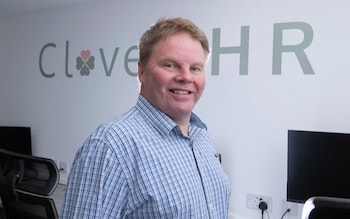
A comfortable job paying an annual salary of £200,000 might seem difficult to complain about. But being a high earner in a world of lifestyle creep and high house prices can trap you in a job with “golden handcuffs”.
Michael Doolin, 54, was deeply unhappy in his well-paid corporate human resources role, which he’d done for 30 years for companies including British Airways and PwC. “I wasn’t enjoying it and it wasn’t enjoying me,” Doolin says.
“The tediousness, the futility of meeting after meeting, the lack of decision-making … I was sick of it. I also wasn’t very good at office politics and I didn’t want to play the game anymore.”
Doolin, who had always dreamt of starting his own business, decided he wanted out. But he felt stuck.
“The salary and my financial responsibilities were keeping me in place. I had a mortgage and my daughters were about to start university, which was going to be expensive,” says Doolin, who lives in Worcestershire. “I come from a cautious Irish background; we don’t take risks. The idea of facing the world on my own – without the protection of institutions and employers – was completely alien to me.”
Doolin was also three years away from a payout from his employer worth around £25,000, which made him feel even more trapped. This is a phenomenon known as golden handcuffs, where employers use a future assurance of financial incentives, such as bonuses, to dissuade staff from leaving, as the cost of replacing them can be vast.
Eventually, Doolin was given the push he needed to give up his generous salary and the bonus he had in the pipeline – but it came from an unlikely place.
“I had been thinking about it for several months. But then I read [Bob] Geldof’s autobiography, which is called Is That It?, and I started asking myself that very question. Was this really all there was to life?
“I wanted my girls to be proud of me and I wanted to be proud of myself and what I’d achieved. I realised that I had enough money in the bank to go from six figures to none, at least for a while. I took a step back, and realised that I didn’t need as much money as I thought to survive.”
At first, Doolin struggled with working on his own in his attempts to launch a business. “I’ve never had to work so hard in my entire life. I gave myself five down days, where I allowed myself to be low and depressed. There were moments where I asked myself: ‘what have I done?’”
But seven years on, Michael’s leap of faith has paid off: he runs a successful company, Clover HR, which turned over around £1m in the previous tax year and employs 35 people.
‘The golden handcuffs get shinier and tighter’
Doolin is not alone in having experienced the sensation of feeling trapped in an enviable position. “We see salary traps a lot, especially with 30- to 40-year-olds,” says Logan Naidu, founder of recruitment group Kernel Global. “There’s a constant pressure to earn more to fund a certain lifestyle. Walking away from it to get a job they might love is difficult.
“But I think there’s been a slight shift, where more people think that life is short, and they need to make the most of a job and seek self-fulfillment. That, of course, gets harder once people have kids.
“I’ve had somebody tell me that they cannot afford to earn less than £1m a year, because they send multiple kids to private school and have a hefty mortgage.”
Many high earners have anonymously taken to social media website Reddit to recount their dilemmas of being trapped in a high-paying job but being miserable. “The golden handcuffs have gotten tighter over the last year or so. I got a pretty decent bonus, a large raise, a promotion and with that I will probably have a lot less grunt work,” writes one anonymous worker.
“But part of me feels even more trapped, like it would be even harder to walk away now. I can up my savings and investments and speed up my road to that golden day of having enough to walk away and retire simply. But is that the trap? The eternal notion of ‘just a little more and I can finally escape’. And then that little more takes you through to 65 or 70 and you need a walking stick to walk away.”
Another Reddit user writes: “I am burned out. I’ve been working 60 hours a week for years and I’m not learning much at work anymore. I had a rough 2023 – my mental health was [poor] and I felt like living on a beach for a year or five, but instead I just went back to work. But most people I’ve talked to think I’d be crazy to outright quit a six-figure job, and they’re kind of right.”
Ask yourself: ‘is that it?’
What advice would Doolin give to others who feel trapped in golden handcuffs or high salaries and are tempted to forge a new path?
“Take a leaf out of Bob Geldof’s book – ask yourself ‘is that it?’ If this is your legacy in 10 years’ time, will you be happy with it?” he says.
“Before taking the plunge, make sure you know yourself, your strengths and weaknesses. Always have a Plan B. I found it reassuring knowing that I could go back to employment if it didn’t work out, as I had lots of experience.

“Never stop networking, and put yourself out there as much as possible; make yourself visible using social media and LinkedIn.”
Naidu adds: “Life is a series of compromises; I don’t think you should feel trapped if you’re doing a job for your family. You can take pride in that.
“But each person’s situation is unique. If you’re feeling miserable every day, and your job is making you feel depressed, that can really negatively impact your family as well as yourself.”
Daniel Harris, of recruitment firm Robert Walters, says: “If professionals feel trapped in a position or company, money or financial perks alone won’t motivate them to do their best, nor is it a long-term solution to retaining them.
“Money and financial perks aren’t exhaustible resources, and employers solely prioritising these sorts of interventions will quickly find their pockets emptied trying to hold onto talent ready to exit.”
Disclaimer: The copyright of this article belongs to the original author. Reposting this article is solely for the purpose of information dissemination and does not constitute any investment advice. If there is any infringement, please contact us immediately. We will make corrections or deletions as necessary. Thank you.



